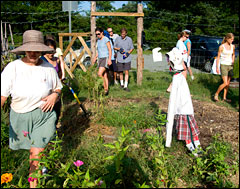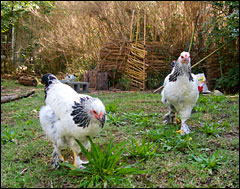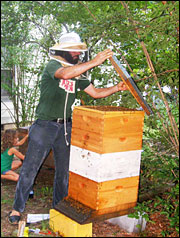
What’s a farm?
I don’t want to get buried in technical definitions, but I’ll take a stab at an informal one: a substantial piece of productive land. When I step out my front door in Carrboro, N.C. — where I spend part of my time — I see plenty of plenty of open land, much of it planted in what might be seen as a cover crop: grass.
Of course, the land isn’t contiguous. Streets, driveways and fences break it up; and single-family houses divide lots into two zones (front and back yards). Still, there’s plenty of arable land, and people, too. In a sense, it’s the negative image of what I saw when I visited Iowa farm country in summer 2007: vast contiguous fields, large buildings stuffed with hogs, almost all of it completely depopulated.
Might Carborro’s leafy neighborhoods, with their hundreds of private homes, be reconceived as a kind of cobbled-together, loosely unified urban farm? That’s the provocative question raised by Carrboro/Chapel Hill’s first-ever Urban Farm Tour earlier this month.
First, a few words about Carrboro. Technically, it’s a town of about 16,500. But really, along with neighboring Chapel Hill (pop. 51,000), it’s a densely populated section of a sprawling, largely (but by no means totally) suburban entity known as the Triangle. Anchored by population centers Raleigh and Durham, the Triangle houses some 1.6 million people.
So think of Carrboro as a kind of urbanized section of a larger, not-so-dense entity. (Bon Appetit was thinking largely of Carrboro when it named the greater area America’s Foodiest Small Town.)
Organized by a group called Carrboro Greenspace, the "urban farm tour" took place on a sunny recent Saturday afternoon. It opened at a residence near Carrboro’s mini-downtown, where a group of five renters tend a thriving vegetable garden and keep a dozen or so laying hens.

Several dozen people from all over the Triangle showed up for the initial tour; dozens more came in waves throughout the afternoon. Carrboro Greenspace organizers led small groups, some on bike and some on foot, on a journey through the town’s various gardens and chicken pens, mostly in people’s yards. The tour culminated at Carrboro Community Garden, one of the most vibrant, productive community gardens I’ve ever seen.
It’s become conventional wisdom in the sustainable-food movement that we need more farmers. In a nation of 300 million, fewer than two million people live on farms. That only works if our few farmers leverage their efforts with agrichemicals and vast fossil-fuel sucking machines, as well as an army of ruthlessly exploited undocumented farmworkers. It seems axiomatic that only with more hands in the dirt can we convert to a more sustainable food system.
Yet given high land prices and dismal economic returns on farming, it’s extremely difficult to imagine how we’re ever going to achieve the goal of more farmers. By revisioning what is a farm and who is a farmer, organizers of the Carrboro Urban Farm Tour shows a way out that knotty dilemma.
I hope it also showed the Town of Carrboro government new opportunities for strategic intervention to increase the town’s sustainability and lower its carbon footprint.The town government has been progressive with regard to food in many ways. Unlike in many places that ban the keeping of chickens, Carrboro has a liberal policy about backyard laying hens. Moreover, Carrboro Community Garden sits on town-owned land under a favorable lease.

But the town could do better to support the budding farm movement. First, it could give the garden permanent or at least long-term status — the current lease expires in a few years. Any sustainable-farm project requires a long-term investment in building soil. Carrboro Community Garden’s volunteers are now making a tremendous effort to build soil with no guarantee that the land will remain in production after the lease expires.
Second, the town could leverage the existing network of passionate, knowledgeable home food producers by creating an agricultural extension service — a town employee whose job is to assist citizens in their efforts to create productive gardens.
Carrboro can serve as a model for other communities nationwide as they strive to increase sustainability and re-imagine food production as an opportunity for meaningful, community-scale economic development.

